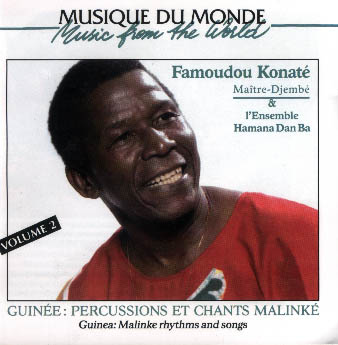Fiche Disque
Musique

ALBUM 2003
Guinée, percussions et chants Malinké vol. 2
Reggie Rock Bythewood

Genre : Album
Date de sortie : 15 Mars 2003
Français
Famoudou Konaté a porté le djembé et la musique malinké sur les scènes du monde entier durant plus d’un quart de siècle lorqu’il était chef-tambour des Ballets Africains de Guinée, la troupe phare du continent africain. Sa musique est l’expression du patrimoine guinéen, chargée d’histoire et inscrite dans la tradition villageoise la plus authentique (circoncision, mariage, baptême, initiation…). Cette tradition ne s’est pas figée dans le temps mais évolue sans cesse, comme Famoudou, dont l’art est également fait de créativité et de modernité. Accompagné par l’ensemble Hamana Dan Ba, Famoudou Konaté a été enregistré, à l’aide des techniques les plus avancées, dans son village de Simbaya (Conakry), comme pour le premier volume de cette série qui fut très remarqué lors de sa sortie en 1999.
English
For over a quarter of a century, Famoudou Konaté has played Malinka music on the stages of the world, as the master drummer of « Les Ballets de Guinée », Africa’s leading traditional dance company. He has moved millions of listeners with his drum playing. Many people, artists and public alike, remember with deep feeling the unforgettable moments that they have experienced at his impressive performances. He is a living legend. Famoudou Konaté has within him the very essence of the musical heritage of the Malinke. If his music « talks » and moves us so, this is because it is full of his own history and the authentic traditions pertaining to villages. For this is where he grew and experienced the major sacred and profane events which take place in a traditional society (circumcision, marriages, baptisms and initiation). The musical tradition in which he has always been immersed is not set in time. It is alive and evolving as he himself is evolving, hence the great modernity of his art. As a member of Les Ballets de Guinée, Famoudou Konaté has constantly innovated and enriched this tradition. By taking it to the sensibilities of various audiences, African and others, he has given it a modern and universal dimension.
Partager :



